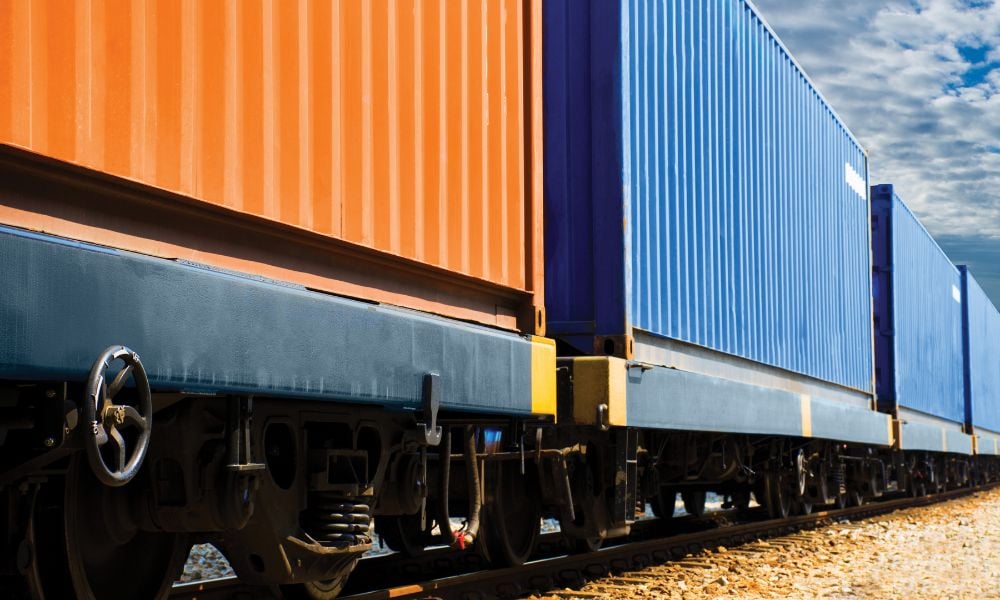'In the continuing absence of physical fail-safe train controls and in the absence of effective interim measures to help ensure the success of administrative defences, there is an ongoing risk of collisions and derailments in signalled territory in Canada'

A distracted train crew and missed signal indications led to a rear-end collision between two Canadian Pacific Kansas City (CPKC) freight trains in British Columbia last year, according to the Transportation Safety Board of Canada (TSB).
The incident happened on Feb. 16, 2024. At 11 p.m. PST, loaded unit coal train 805-339 was proceeding westward at 22.3 mph on the north main track of the Mountain Subdivision when it collided with the trailing car of stationary unit grain train 301-230 at Mile 116.8 near Greely.
The four head-end locomotives on train 805-339 derailed, one of which caught fire. Four cars on train 301-230 also derailed, one of which also caught fire.
Both crew members of train 805-339 were taken to a local hospital, one with serious injuries.
As a result of the collision, approximately 17,500 litres of diesel fuel leaked from the derailed locomotives, of which an undetermined amount burned, according to TSB.
Call from the rail traffic controller
When train 805 was approaching signal 1149N, the crew received a call from the rail traffic controller (RTC) indicating that a wheel temperature detector (WTD) had identified cars with ineffective brakes on the train, according to TSB.
The crew continued to discuss the cold wheel information after the RTC’s call.
“The call divided the crew’s attention and diverted their focus away from the upcoming signal,” said TSB.
This resulted to the train continuing on its way despite a Clear to Stop indication,
“The crew on train 805 formed an incorrect mental model that they were still operating on the previous Clear indication rather than the Clear to Stop indication. Consequently, they were not prepared to stop when the tail end of train 301 came into view,” said TSB.
Despite train 805’s locomotive engineer applying air brakes 439 feet beyond the signal, the train still collided with train 301.
Safety actions from CPKC
Following this occurrence, CPKC took the following safety actions, according to TSB:
- In February 2024, it implemented a module on situational awareness as part of the conductor training.
- On March 8, 2024, it installed software that provides a message to mechanical support personnel when a report from a wheel temperature detector (WTD) on the Mountain Subdivision includes a car that would not be on a unit train subject to WTD inspection.
- On March 21, 2024, mechanical support personnel began creating a master list to verify that car numbers on cold car reports are correct for unit trains subject to the exemptions granted by TC for coal, sulfur, potash, and grain trains.
- On May 17, 2024, it created a job aid intended for the mechanical support personnel, which provides instructions to verify that the cars with cold wheels listed in WTD reports are the proper series. If the report contains a car number from another train, the car number must not be provided to the train crew of the unit train identified on the report. This process reduces the time it takes a train crew to obtain accurate information on cars with cold wheels, according to TSB.
- In October 2024, it incorporated in its training program a module about respecting signal indications.
- From Sept. 16 to Oct. 16, 2024, it conducted a blitz to ensure that all train and engine employees watched a new Respect the Signal video and discussed its content. This 5-minute video demonstrates what can happen if employees lose situational awareness and fail to respect the signals.
Meanwhile, on Feb. 27, 2024, as a result of this occurrence and other recent collisions involving trains operating under restricting signals in centralized traffic control territory, the TSB sent Rail Transportation Safety Advisory Letter 01/24 to Transport Canada (TC).
The TSB suggested that, as a priority, TC work with the railway industry to address the limitations with the existing administrative defences to reduce the likelihood of collisions when trains operate under restricting signals in centralized traffic control territory, and to reduce the risks to train crews and the travelling public, noted TSB.
“In the continuing absence of physical fail-safe train controls and in the absence of effective interim measures to help ensure the success of administrative defences, there is an ongoing risk of collisions and derailments in signalled territory in Canada,” said TSB.




